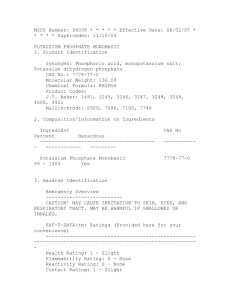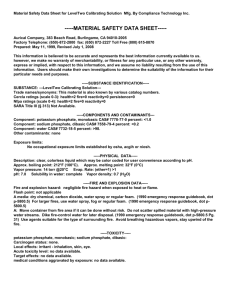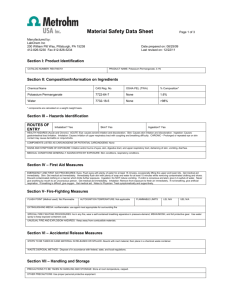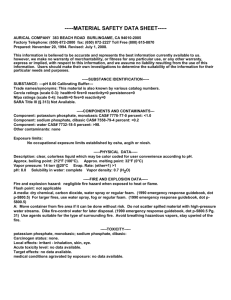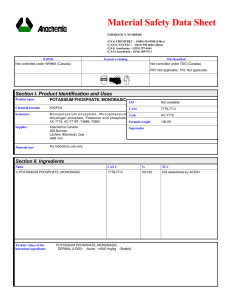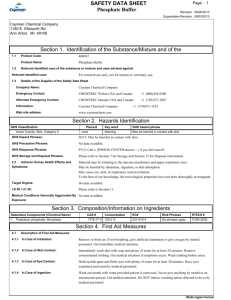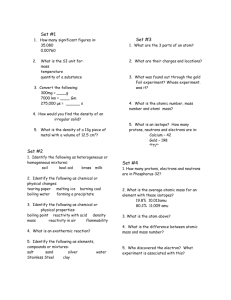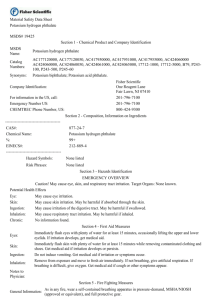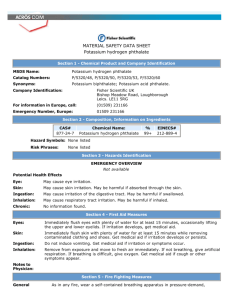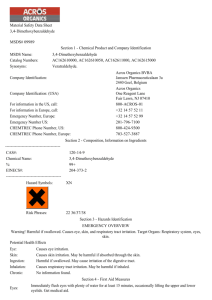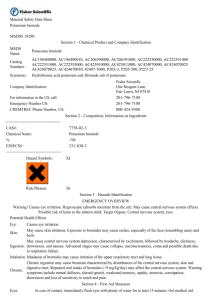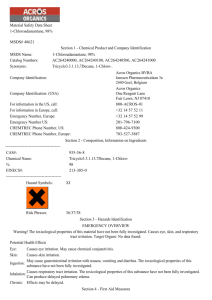Material Safety Data Sheet Potassium phosphate
advertisement
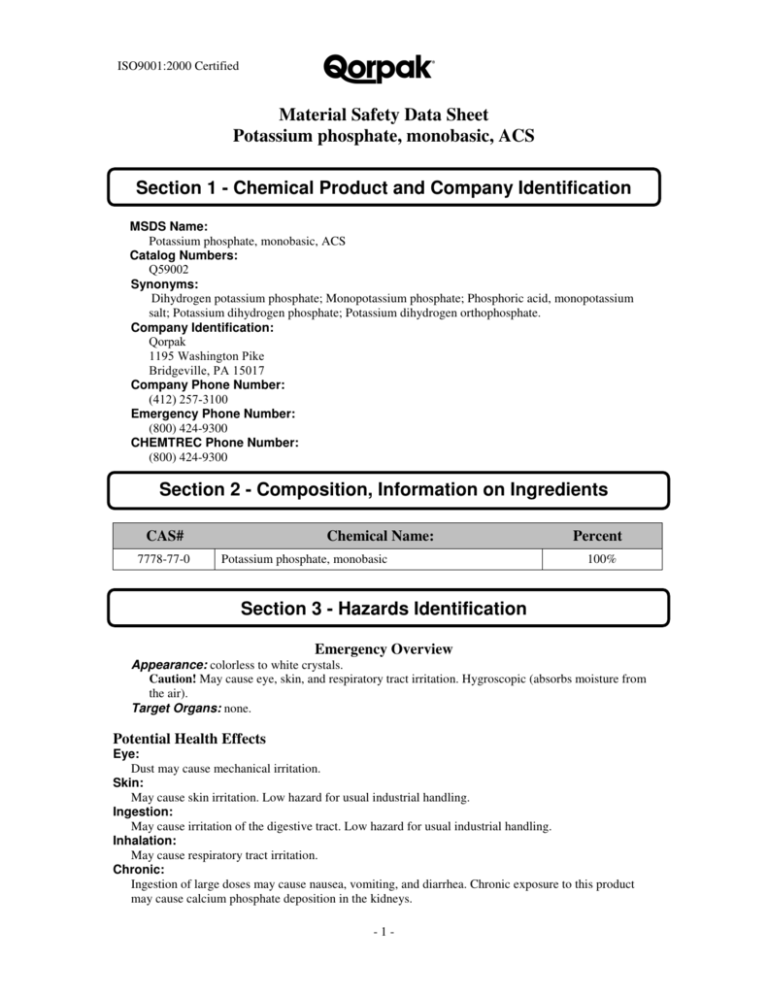
ISO9001:2000 Certified Material Safety Data Sheet Potassium phosphate, monobasic, ACS Section 1 - Chemical Product and Company Identification MSDS Name: Potassium phosphate, monobasic, ACS Catalog Numbers: Q59002 Synonyms: Dihydrogen potassium phosphate; Monopotassium phosphate; Phosphoric acid, monopotassium salt; Potassium dihydrogen phosphate; Potassium dihydrogen orthophosphate. Company Identification: Qorpak 1195 Washington Pike Bridgeville, PA 15017 Company Phone Number: (412) 257-3100 Emergency Phone Number: (800) 424-9300 CHEMTREC Phone Number: (800) 424-9300 Section 2 - Composition, Information on Ingredients CAS# 7778-77-0 Chemical Name: Potassium phosphate, monobasic Percent 100% Section 3 - Hazards Identification Emergency Overview Appearance: colorless to white crystals. Caution! May cause eye, skin, and respiratory tract irritation. Hygroscopic (absorbs moisture from the air). Target Organs: none. Potential Health Effects Eye: Dust may cause mechanical irritation. Skin: May cause skin irritation. Low hazard for usual industrial handling. Ingestion: May cause irritation of the digestive tract. Low hazard for usual industrial handling. Inhalation: May cause respiratory tract irritation. Chronic: Ingestion of large doses may cause nausea, vomiting, and diarrhea. Chronic exposure to this product may cause calcium phosphate deposition in the kidneys. -1- Material Safety Data Sheet Potassium phosphate, monobasic, ACS Section 4 - First Aid Measures Eyes: Immediately flush eyes with plenty of water for at least 15 minutes, occasionally lifting the upper and lower eyelids. Get medical aid. Skin: Get medical aid. Flush skin with plenty of water for at least 15 minutes while removing contaminated clothing and shoes. Wash clothing before reuse. Ingestion: Never give anything by mouth to an unconscious person. Get medical aid. Do NOT induce vomiting. If conscious and alert, rinse mouth and drink 2-4 cupfuls of milk or water. Inhalation: Remove from exposure and move to fresh air immediately. If not breathing, give artificial respiration. If breathing is difficult, give oxygen. Get medical aid. Notes to Physician: Persons with impaired kidney function may be more susceptible to the effects of this substance. Treat symptomatically and supportively. Section 5 - Fire Fighting Measures General Information: As in any fire, wear a self-contained breathing apparatus in pressure-demand, MSHA/NIOSH (approved or equivalent), and full protective gear. During a fire, irritating and highly toxic gases may be generated by thermal decomposition or combustion. Extinguishing Media: Use water spray, dry chemical, carbon dioxide, or appropriate foam. Autoignition Temperature: No information found. Flash Point: No information found. NFPA Rating: Health-1; flammability-0; reactivity-0 Explosion Limits: Lower: n/a Upper: n/a Section 6 - Accidental Release Measures General Information: Use proper personal protective equipment as indicated in Section 8. Spills/Leaks: Vacuum or sweep up material and place into a suitable disposal container. Clean up spills immediately, observing precautions in the Protective Equipment section. Avoid generating dusty conditions. Provide ventilation. -2- Material Safety Data Sheet Potassium phosphate, monobasic, ACS Section 7 - Handling and Storage Handling: Use with adequate ventilation. Minimize dust generation and accumulation. Avoid contact with eyes, skin, and clothing. Keep container tightly closed. Avoid ingestion and inhalation. Use with adequate ventilation. Wash clothing before reuse. Storage: Keep container closed when not in use. Store in a tightly closed container. Store in a cool, dry, wellventilated area away from incompatible substances. Store protected from moisture. Section 8 - Exposure Controls, Personal Protection Engineering Controls: Facilities storing or utilizing this material should be equipped with an eyewash facility and a safety shower. Use adequate general or local exhaust ventilation to keep airborne concentrations below the permissible exposure limits. Exposure Limits: Chemical Name: Potassium phosphate, monobasic NIOSH ACGIH none listed none listed OSHA none listed OSHA Vacated PELs: Potassium phosphate, monobasic: No OSHA Vacated PELs are listed. Personal Protective Equipment Eyes: Do not wear contact lenses when working with chemicals. An eye wash fountain should be available in the immediate work area. Wear appropriate protective eyeglasses or chemical safety goggles as described in 29 CFR 1910.133. Skin: Wear appropriate protective gloves to prevent skin exposure. Clothing: Wear appropriate protective clothing to prevent skin exposure. Respirators: Follow the OSHA respirator regulations found in 29 CFR 1910.134. Use a NIOSH/MSHA approved respirator if exposure limits are exceeded or if irritation or other symptoms are experienced. Section 9 - Physical and Chemical Properties Physical State: Color: Odor: pH: Vapor Pressure: Crystals White Odorless Not available Not available -3- Material Safety Data Sheet Potassium phosphate, monobasic, ACS Vapor Density: Evaporation Rate: Viscosity: Boiling Point: Freezing/Melting Point: Decomposition Temperature: Solubility in water: Specific Gravity/Density: Molecular Formula: Molecular Weight: Not available Not available Not available Not available 252.6°C > 253°C Soluble 2.338 g/cm3 KH2PO4 136.09 Section 10 - Stability and Reactivity Chemical Stability: Stable under normal storage and handling conditions. Conditions to Avoid: Dust generation, moisture. Incompatibilities with Other Materials: No significant incompatibilities identified with common materials and contaminants. Hazardous Decomposition Products: Oxides of phosphorus, irritating and toxic fumes and gases. Hazardous Polymerization: Has not been reported. Section 11 - Toxicological Information RTECS: CAS# 7778-77-0: TC66 LD50/LC50: CAS# 7778-77-0: Skin, rabbit: LD50 = >4640 mg/kg Carcinogenicity: CAS# 7778-77-0: Not listed by ACGIH, IARC, NTP, or CA Proposition 65. Epidemiology: No information available. Teratogenicity: No information available. Reproductive: No information available. Mutagenicity: No information available. Neurotoxicity: No information available. -4- Material Safety Data Sheet Potassium phosphate, monobasic, ACS Section 12 - Ecological Information Other: When too many nutrients such as phosphorus are in the water, algae grows maniacally. Algae blooms are followed by a die-off, and as material decays, it consumes oxygen like a forest fire. No fish, plants or insects can live in oxygen-free zones. Section 13 - Disposal Considerations Dispose of in accordance with Federal, State, and local regulations. Section 14 - Transport Information US DOT Shipping Name: Not regulated. Hazard Class: UN Number: Packing Group: Section 15 - Regulatory Information US Federal TSCA: CAS# 7778-77-0 is listed on the TSCA inventory. Does not have a Significant New Use Rule. SARA Reportable Quantities (RQ): CAS# 7778-77-0 does not have an RQ. CERCLA/SARA Section 313: Not reportable under Section 313. OSHA - Highly Hazardous: Not considered highly hazardous by OSHA. US State State Right to Know: CAS# 7778-77-0 is not listed on the following state right to know lists: California, Florida, Minnesota, New Jersey, Pennsylvania, and Massachusetts. California Regulations: Not listed. European/International Regulations Canadian DSL/NDSL: CAS# 7778-77-0 is listed on Canada’s DSL List. Canada Ingredient Disclosure List: CAS# 7778-77-0 is not listed on the Ingredient Disclosure List. -5- Material Safety Data Sheet Potassium phosphate, monobasic, ACS Section 16 - Other Information MSDS Creation Date: August 7, 2006 Revision Date: None Information in this MSDS is from available published sources and is believed to be accurate. No warranty, express or implied, is made and Qorpak assumes no liability resulting from the use of this MSDS. The user must determine suitability of this information for his application. -6-
